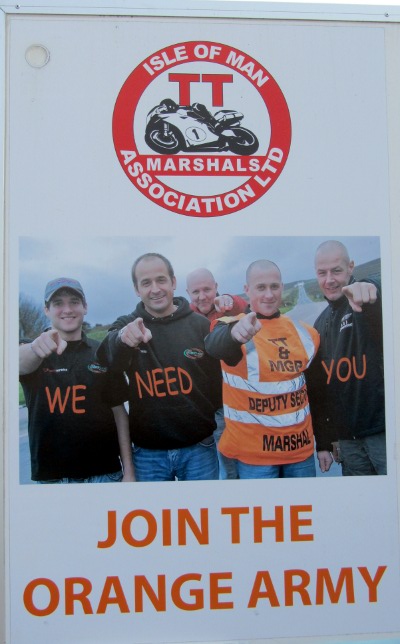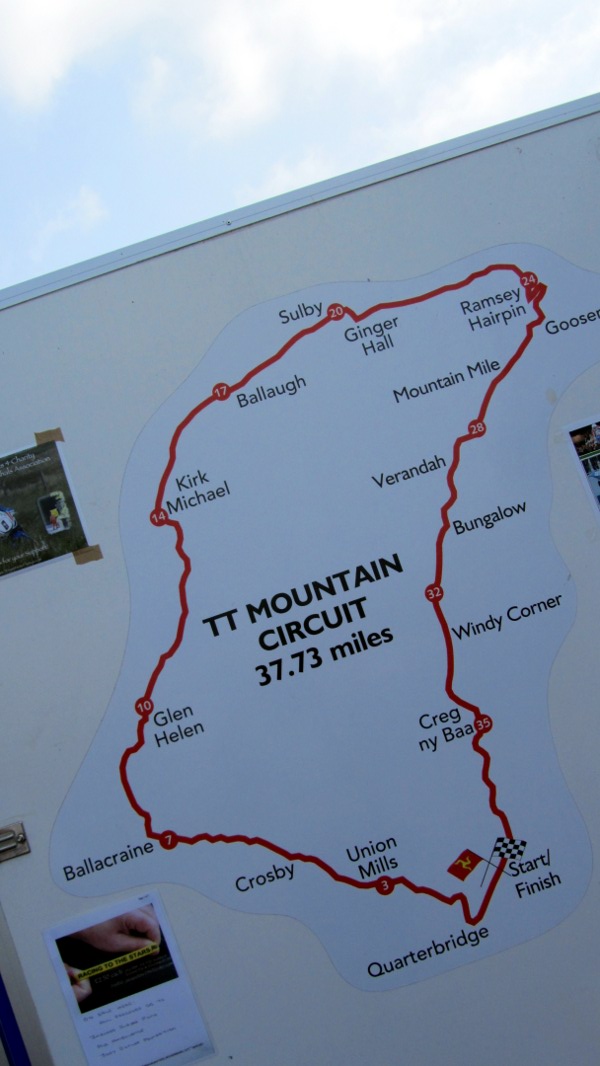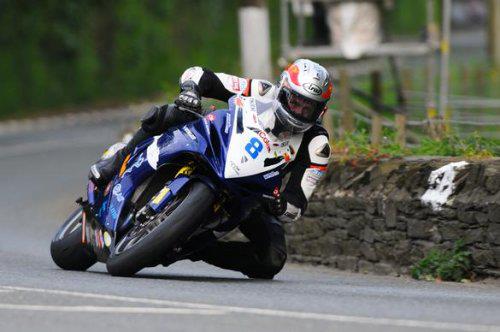The Marshal's Tale – a story from the TT races
Here's an inside story from back stage at the TT
John Newman
Tony is the type of person who gets an idea and then follows it through to its conclusion. Last year the idea was to paddle 240 miles through the canal system from London to Manchester in a single seater kayak, raising money for the London Air Ambulance. The expedition required him to lift the canoe up and around 160 plus locks.
Not exactly convenient, but he concluded that this was a more cost effective adventure than his previous choices; long distance desert rallies in Tunisia and Morocco on his KTM enduro bike...the kayak didn't require fuel.
The Marshal's in town
Tony is a Paramedic and the 2013 idea was to offer himself and his skills as part of the team of Paramedic Marshal's who form a vital part of the complex organisation that is the Isle of Man TT. The marshals are a segment of the whole festival that many of us perhaps take for granted and do not always consider amongst the information and focus on the top riders and their seemingly impossible feats, but without them the TT would not be able to take place.
Following registration he was invited to two mainland based training courses. An important component of which was to link up with experienced marshals in the TT Marshals Association so that he could familiarise himself with the way they operate when an incident occurs.
The on-course medical response services at the TT and other motorcycle races such as the Classic TT (Manx Grand Prix) and the Southern 100, are operated by the Isle of Man based Motorsport Medical Services (MMS). Headed by a retired consultant from Nobles Hospital David Stevens, who has been awarded an MBE for his development and leadership of the organisation.
MMS is an amalgamation of two charities set up by the family and friends of two riders who died on the course in the 1980's: Rob Vine and Phil Hogg. It is responsible for the effective organisation of the very professional medical teams who attend on course crash incidents; including the coordination of the two helicopters which can be on the scene within 5/6 minutes of being alerted from a marshal's electronic signal.
It's worth exploring their website to get a comprehensive idea of how this aspect of the TT functions, and the dedication to the races that exists on the island
www.mms.org.im
From Gooseneck to Windy Corner
Tony showed me the Comprehensive Incident Management manual that accompanied him to the island, including his duty rota for race and practice days. Locations that included some of the famous and romantic names around the TT course – Ramsey, Gooseneck, Mountain Box, Black Hut, Windy Corner, Hillberry, Sulby Bridge. But it didn't all go exactly as planned.
On one of the race days he swapped locations with a colleague, but had forgotten about the arrangement until the second Paramedic fetched up at the same marshalling station. Tony needed to be on the other side of the island and the roads were about to be closed.
He jumped on his BMW F800GS and headed for the Grandstand on Glencrutchery Road where he found one of the course closing cars about to set off. He rapped on the window and asked the driver for a lift round, to the surprise and additional delight of two passengers: Aussie TT fans who had bought a VIP package which included a ride in the course closure car.
As the passengers attempted to record their experience on camera Tony clung to the passenger strap as the VW Golf was smoothly accelerated to 100mph at every opportunity. Another view of the course and TT organisational system that added to his growing admiration of the skills of drivers and travelling marshals. Many of them ex-riders now using their knowledge to keep everything as safe as possible in this high risk arena.
The 'Milky' Way
One of those aforementioned ex-riders is Richard 'Milky' Quayle whose racing career ended with a crash at 160mph back in the eighties He now promotes the TT on behalf of the Isle of Man Tourist Board, and is one of the lead riders showing newcomers the course. There are other island based riders also doing this valuable job such as John Barton (sponsored by
Wemoto).
You can watch a video on the Daily Telegraph website where Milky, John, Conor Cummings and Simon Andrews talk to the reporter Bee Rowlatt about the races. Her comments after a lap as Quayle's pillion are a priceless endorsement of motorcycling
www.telegraph.co.uk/motoring/motoringvideo.Milky-Quayle-Isle-of-Man-TT
Tony explained how, at the marshalling points, it's important for the Paramedic on duty to be able to assess where the motorcycle and rider might land should the worse happen: not always
obvious. Being able to reach a fallen rider by saving precious seconds could literally prevent more serious injury through loss of blood etc; or in some cases, prevent loss of life in those minutes before the helicopter is able to reach the incident.
He didn't need to use his training during the races or practice, but in one of his observations he told me that as speeds increased year on year the incidents of bikes high siding in a crash also increased. And as anyone who is a regular viewer of Moto GP or BSB on TV, or attends road race meetings through the season will attest, these are the most dramatic and dangerous from an injury or medical perspective.
Speed is of the essence
Record lap times at the TT are now incredible. John McGuiness the outright record holder completes a lap in 17mins 11.572seconds (131.671mph). Even the TT Zero electric bike record lap by Michael Rutter is timed at 20mins 38.462secs (109.675mph). How long do you reckon it would take to walk the 37.75 miles of the mountain course?
On his 'day off' along with another (possibly deranged) Paramedic colleague, Tony decided to walk the whole way round. So for those of you who may be at the upcoming Manx Grand Prix or Classic TT in August, and fancy a stroll. I can reveal exclusively that it took two very fit outdoor adventure types fifteen hours: 7.00am until 10.00pm.
They did stop at various points on their journey, and one of the abiding impressions Tony brought away from this mega-hike was the number of memorials people had placed or erected along the way for friends or relatives who had either died on the course or had been lifelong fans who wanted to be remembered in this way. Some poignant moments.
Couldn't happen without them
TT Marshals and Paramedic Marshals are volunteers who have to find their own way to the island and arrange their accommodation. They do get expenses which are paid to help with the high cost of fuel and food and drink. Tony was on the island for just over two weeks, and unless you have a generous employer (very rare) this will be time which has to be taken from any holiday entitlement.
But such is the enthusiasm, pleasure, satisfaction and camaraderie at being able to contribute to the world's greatest motorcycle festival, that the hundreds of marshals required to make this ensemble of speed happen will commit themselves to the 2014 races, hats off to them.
Wemoto



